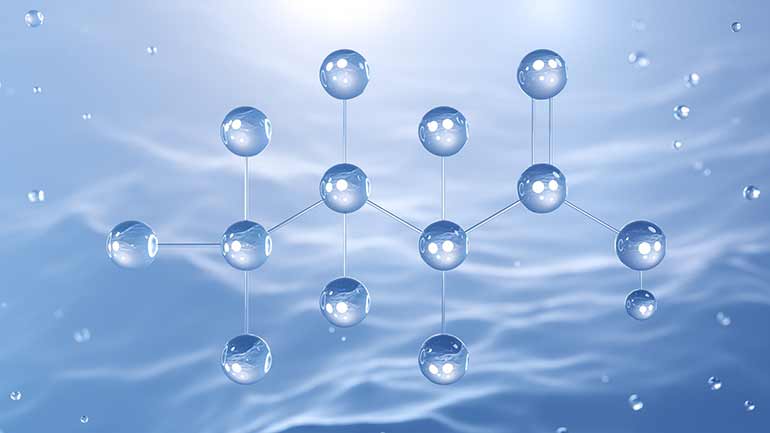PFAS exemptions required for critical applications
10th July 2023
GERMANY: A leading German research body has said that, without exemptions, any future PFAS regulation could jeopardise the safe and effective uninterrupted operation of refrigeration and heat pump systems.
In a position statement, Germany’s Research Council for Refrigeration Technology (FKT) presents the most important consequences of the proposed regulation on many critical infrastructure applications.
The position paper, which expands on the concerns raised by the FKT and reported in the Cooling Post at the end of May, is to be submitted to the European Chemical Association shortly, with further steps planned. The statement is supported by a number of German RACHP associations, guilds and institutes.
In February, a group of five European states – Germany, the Netherlands, Norway, Sweden and Denmark – proposed a ban on PFAS substances under a definition that would include practically all HFC and HFO refrigerants. Those proposals are currently being assessed by the European Chemical Association.
Severe consequences
The FKT says it supports the goal to protect human beings and the environment against the risks associated with the unrestricted use of chemicals, but insists that a general prohibition of the entire PFAS group of materials would have considerable consequences for the manufacturing industry and hence also on the refrigeration and heat pump industry. The possible impact of the proposed regulation of PFAS materials is currently being investigated by FKT members in detail.
In addition to affecting practically all HFC and HFO refrigerants, a ban would also prohibit the use of a number of critical refrigeration components, including vital gaskets and other sealing systems, electrical and electronic components, and wear-resistant coatings.
It points out that bearings, washers and shaft seals are all made from PTFE materials that would be under threat. These are currently used to ensure that components are sealed to prevent leakage of refrigerants including HFCs, carbon dioxide and ammonia.
Under the proposed definition, low friction coatings which increase energy efficiency, extend their longevity and reduce maintenance and repair costs would also be affected.
O-rings, packed glands, flat gaskets and other sealing systems made for example from PTFE- and FKM-based material combinations or other fluoroelastomers enable the correct operation of isolating and regulating valves at various locations within a refrigeration system.
Valves are required to be tight-sealing in order to meet safety requirements and reduce leakage of refrigerants to the environment and make sure certain sections of the refrigeration systems can be isolated safely when needed.
“Many of the materials used before 1950 have unacceptably high leakage rates or are no longer permitted because they do not meet modern safety standards (ie lead, asbestos),” the FKT says in its statement. “Alternatives to PFAS-containing materials that are capable of meeting the very high performance requirements now required are not available at present.”
It adds that research to find suitable alternatives and the rigorous laboratory and field testing required to prove their suitability for practical use in refrigeration will take many years.
The windings for motors used to drive compressors, refrigerant pumps and regulating valves, are often protected with fluorine-containing coatings. In addition, sensors, electrical components and controls are installed throughout refrigeration and heat pumps systems. “Their function and durability rely on PFAS-containing materials that make energy efficient operation possible,” the FKT says.
Replacements unclear
“We see that PFAS-containing materials play a central role in the safe and functional operation of refrigeration systems and heat pumps,” commented Felix Flohr of Daikin Chemical Europe, who chairs the working group. “How these functions can be replaced is still unclear.”
The FKT membership, which includes representatives from industry together with research institutions, is said to be convinced that without the use of PFAS-containing materials the safe and effective uninterrupted operation of refrigeration and heat-pump systems is not possible.
It argues that the loss of refrigeration and air conditioning systems in critical infrastructures, like hospitals, data centres, energy plants and the entire cold chain, even for a short period of time, would have extreme adverse consequences in all areas of society.
In addition, it stresses that refrigeration plants are typically operated for more than 20 years and require an uninterrupted supply of spare parts/repairs of components.
“Without PFAS-containing materials the achievement of the European Green Deal would be questioned and put at risk,” the statement says. “When evaluating the risks to the refrigeration and heat pump technology necessary to fulfill basic tasks for society, exemptions from the PFAS regulation are essential from the FKT’s point of view.”
Related stories:
PFAS ban considers impact on heat pumps – 7 February 2023
EUROPE: A number of HFC refrigerants and low GWP HFO alternatives could be banned under new PFAS chemical restrictions proposed to the European Chemicals Agency (ECHA). Read more…
PFAS refrigerant ban could impact EU green aims – 4 January 2023
EUROPE: The chemical industry claims that proposals to ban certain refrigerants as PFAS substances under the European REACH regulations could compromise EU Green Deal and REPowerEU goals. Read more…
HFC/HFO ban would have “major consequences” – 20 September 2021
NETHERLANDS: The Dutch association representing 400 refrigeration and air conditioning companies has hit out at its own country’s proposals which could ban HFCs and HFOs under a new REACH regulation. Read more…
REACH proposals could hit HFC and HFO refrigerants – 21 July 2021
EUROPE: While Europe continues with the HFC refrigerant phase down, new proposals to be put before the Commission could see further restrictions or even bans on HFCs and HFOs. Read more…
REACH proposal is unclear – 23 July 2021
EUROPE: The European chemical trade association, CEFIC, has admitted that it is unclear what HFC and HFO refrigerants are included in the new REACH regulation proposals. Read more…
Refrigerants under threat from new PFAS proposals – 15 July 2020
EUROPE: Proposals to restrict the use of PFAS – a range of chemicals dangerous to health – could further impact the use of HFC and HFO refrigerants in Europe. Read more…







